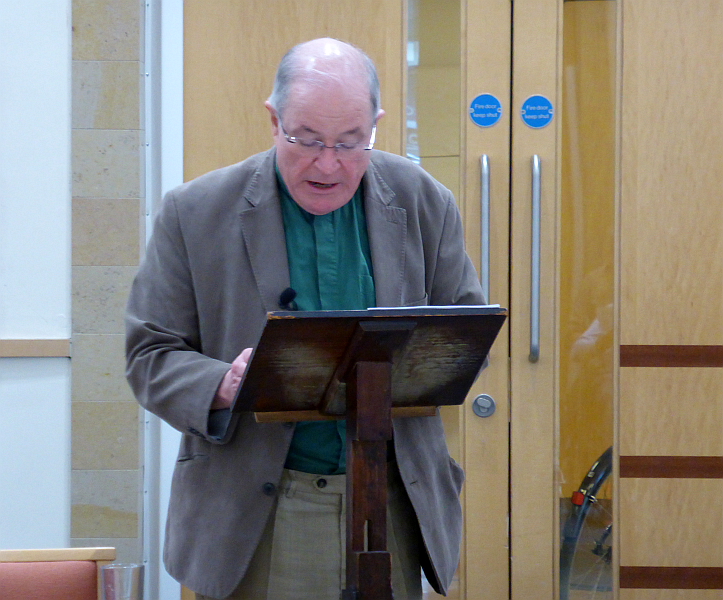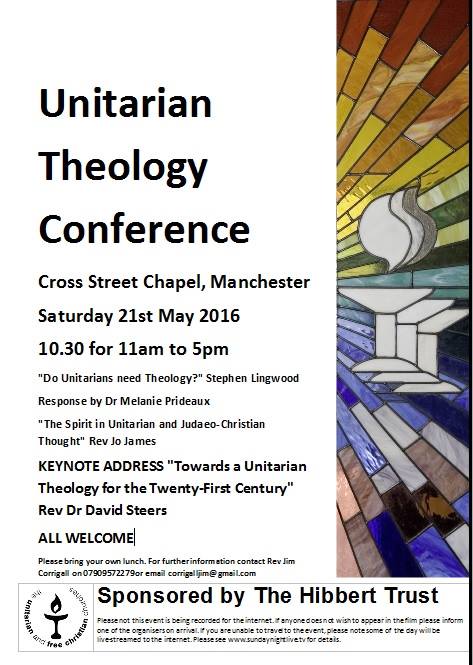
On Saturday 21 May 2016 I attended the Unitarian Theology Conference at Cross Street Chapel in Manchester.
I had been in two minds about going, but engagement in theological topics on the UK Unitarian Facebook page tipped me towards going, hoping that I could make a contribution. Against going was the fear that it would be prescriptive and in the hands of conservative voices that lacked some relevance and, more to the point, dug up a theology long past when there are so many theologies available these days across the widest span of belief.
The Keynote Speech was billed as Towards a Unitarian Theology for the Twenty-First Century delivered by the Rev. Dr. David Steers. As it was, ill-health prevented David Steers from travelling over from Ireland, so it was delivered by the Rev. Jim Corrigall at the end if before the panel and without question or comment.

Had it been delivered at the beginning (if this was intended), I think I would have been instantly depressed, although then the speeches would have improved. Possibly Dr. Melanie Prideaux could or would have responded to it as well as the Rev. Stephen Lingwood's presentation, and her responses might well have been very different. The poster suggests that David Steers' paper would have had a free run regardless of her commentary, but questions would have followed and I could have asked many!

This is an interpretive account, which means it is accurate in so far as I heard it and noted it and have regenerated it since. Others should listen for themselves. My diary entry for the day is 10 pages A4 (the record ever since 1980 is 14 for one day, and then 12). The diary entry followed the note taking at the conference. I have since recreated sound files of selected parts of the conference. The first lecture covered in my diary is the David Steers writing so I am also taking this first here.
It started as a hymn to the late Rev. Arthur Long, but the framing was his ability to engage with any Christian theology. Arthur Long's teaching underpinned David Steers ten years in Belfast. You could see where this was going straight away. The lecture would have started with a game to identity past Unitarian and non-Unitarian statements. Yes, which is the point: things change and one cannot wind the clock back. Then the lecture attempted to wind the clock back. This was not going towards the twenty-first century; in fact it was going backwards fast.
The complaint was that Unitarianism is anti-theological, whereas Joseph Priestley produced a belief statement every year with 3000 copies made over 15 years. Unitarianism lacks theological rootedness, and the revision of the Object speeded that up with its reversion to vague 'principles'. That's interesting, because the vague and potentially meaningless 'uphold liberal Christianity' was a theological statement of intent inserted by the conservative faction, a present-future use of language, and precisely one of those things Melanie Prideaux later said that Unitarian unrooted decision making method goes along to ignore contentious matters that may be formally agreed.
R. K. Webb had said that twentieth century Unitarianism lost its theology when it splintered into social service, non-Christianity, spiritualism and "competing enthusiasms". It was painfully accurate, wrote David Steers. Really? Perhaps it was pleasurably evolving into social justice, broader thought, the place of Spirit (as via Jo James later) and lots of discussion Building Your Own Theology (approved at the Panel). David Steers further sneered at the very recent Next Steps video and report as anti-theological, although he was correct that new ways of doing church already existed (in Anglicanism and Methodism) in Fresh Expressions.
(Fresh Expressions is interesting. It is supposed to be different, fresh and expressive, but it comes under clergy supervision and control: take how the Forest Church, for example, is neo-Paganism with a reinforced Trinity applied. Pagans will not be duped by it. But they might welcome a true openness in Unitarianism where the neo-Paganism and liturgical inventiveness meets critical discussion regarding 'magic' and encounters other views that purer Pagan groups do not include.)
There was little for traditional congregational life, his writing stated. Congregations ought to have deep roots and a stream of life in disordered surroundings [Andrew Hill]. They must know who they are and what they are for. Going back to the seventeenth century, congregations were once secure in their identity, and by lasting showed something of value.
If faith and reason are not balanced then participants are traitors to their ancestry. Without faith there is no power beyond ourselves; without reason there is delusion and being led astray. The faith side has been jettisoned but today reason is being forgotten. Without each as now the denomination is pitiable.
This notion that there are Unitarians without knowing it: such people need to connect with what the community stands for to be counted as Unitarian. The Quakers have a better public recognition because they know their tradition, and they operate within a matrix of scripture, tradition and culture.
So David Steers wanted 'faith' - comprised from scripture, tradition and culture and the application of reason. Tradition is important, but without it Unitarianism cannot explain why a church looks like it does: who built it, why it is here, what is believed... He took a swipe even at Cross Street chapel when it ceased to look old fashioned.
Er, how is this going towards the twenty-first century? He wrote that we should not be absorbed in such stories but it is a foundation. If we do not cherish them someone else will, and without this a liberal denomination is open to infiltration. Well, actually, I know the stories and I can cherish them but I don't fancy being the curator of a museum.
Unitarians played an important part in biblical tradition and criticism but we cannot jettison this completely because we would miss out on a significant account of the divine in human affairs. We would replace it with the facile and superficial. Again, what loss is there in adding to it the Bhagavad Gita, the Pali Canon, Islamic texts, and literature? Who is ditching and becoming uncritical?
He quoted Robert Runcie that by following culture only we'd end up following the latest fad, just as tradition only would produce one's own echo. Such was written for Anglicans: if Unitarians ever going to simply listen to their own echo this presentation was coming close.
H. L. Short had said great causes do not die because of opposition or internal dissention but from weariness and loss of vitality.
Well, who is being weary here? This is also to ignore more profound forces of secularisation and changing lifestyles in the wider population.
Then he had a crack at the development of pluralism because it hinders the place of Unitarianism at the interfaith meeting. Each group needs to maintain its collective position and have one for such a meeting. Cliff Reed had said that Unitarianism if rooted theologically could meet other faith traditions - ruling out a pluralist position.
But, again, this echo ignores the pluralism of some contemporary theologies: for example, the pluralist universalism of John Hick.
There was an attack on the Unitarian Universalist Association as a hegemony over suffienctly unrelated Transylvanians and the British, and it dominated the misled understanding of 'Liberal Religion' of members of the International Association of Religious Freedom. Different members attending might have been liberal, and they might have been of religion, but they were not 'liberal religion' nor a fellowship of liberal religion.
In addition he said that the British forget that the Universalism of the UUA is not some neutral high stance but a specific Christian view of salvation for all. Humm: definition by etymology when the use has changed. Universalism means what we have made it mean. Or back to the past then.
Of course what he didn't say was that on such a basis Northern Irish religion or even Island of Ireland religion is equally inappropriate or irrelevant for British Unitarianism. Plus Ireland itself might well be in transition from where the culture still upholds a common somewhat more than residual Christianity. For me, religion in Ireland was and is part of the ethnic problem, not the solution, and Ireland and its religion never held any attraction for me. I can see it might be attractive for Unitarian ministers seeking to maintain Christian forms and having larger congregations.
He stated that we are Dissenters, because we are in a country with an established Church. Turn the sound down and Sunday Assembly, the atheist gathering, looks just like the fundamentalist Holy Trinity Brompton. When I reported this view to Hull Unitarians after the Sunday May 22nd service, it was met with laughter, and I said we may as well stand straight and perhaps wear bowler hats (forgetting that bowler hats have an unwelcome resonance for backwardness in Northern Ireland). He wondered if we contribute anything to the great debate of our time, and that we need a 'commanding vision' where we worship, pray, and need scripture and celebration, cobining faith and reason. It needs symbolism and imagination but also confidence and trust in reason through intellectual argument.
I am not saying that such a paper should not have been presented, but it surely should have been presented with a critique. It had a free run, and it needed challenging. It had nothing to offer the future other than the past, and took no account of change other than to lament what had taken place in recent times.
Sunday Assembly needs to prove itself. It may go the way of the Ethical Churches or the Labour Church. But it has tapped into something in our culture: a need for fellowship, perhaps, and for rejoicing and concern, a secular version of religion. It is one possibility. Melanie Prideaux referred to the secular into Unitarianism. But some sort of reinforced historical dissent has no connection with the out there. Of course it has a history, and there is a flow to now, and it has a shadow and colours the present, but it simply cannot perform from that historical time to this. Rather, the tradition is the anti-tradition of evolving, changing, finding the new forms, and both using and examining these. Perhaps British Unitarianism, small as it is, was mid-way between Unitarian Universalism and Non-subscribing Irish Christianity, but it is moving towards the UUA, and this is where relevance is to be found to connect with the 'out there', for whom having an established Church is becoming either unethical in its stances or irrelevant. Do keep up.
Adrian Worsfold
Pluralist - Liberal and Thoughtful